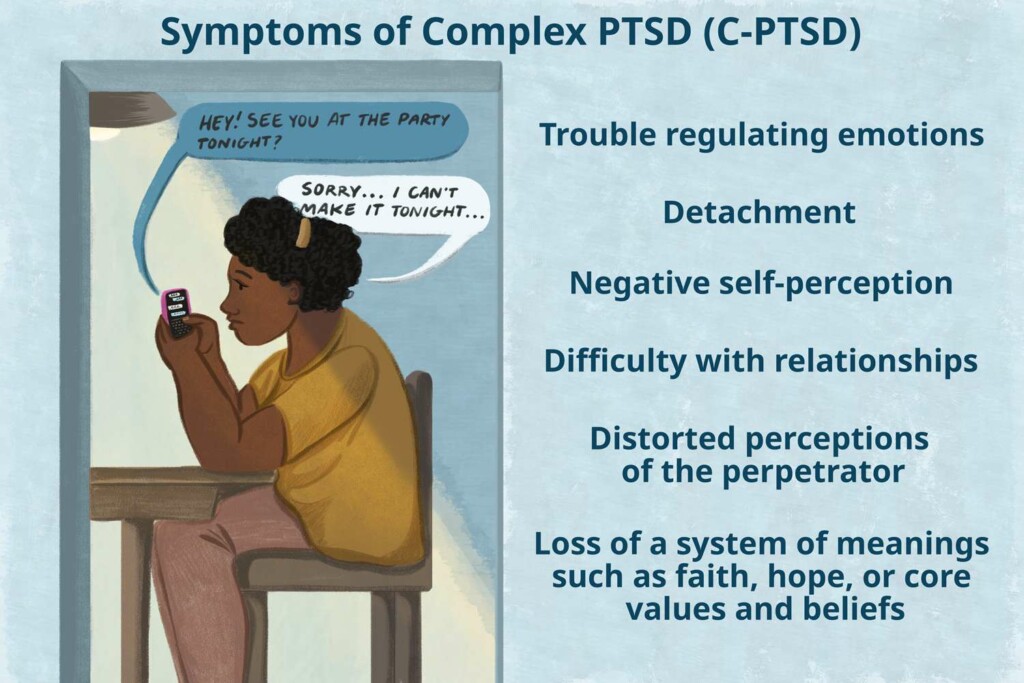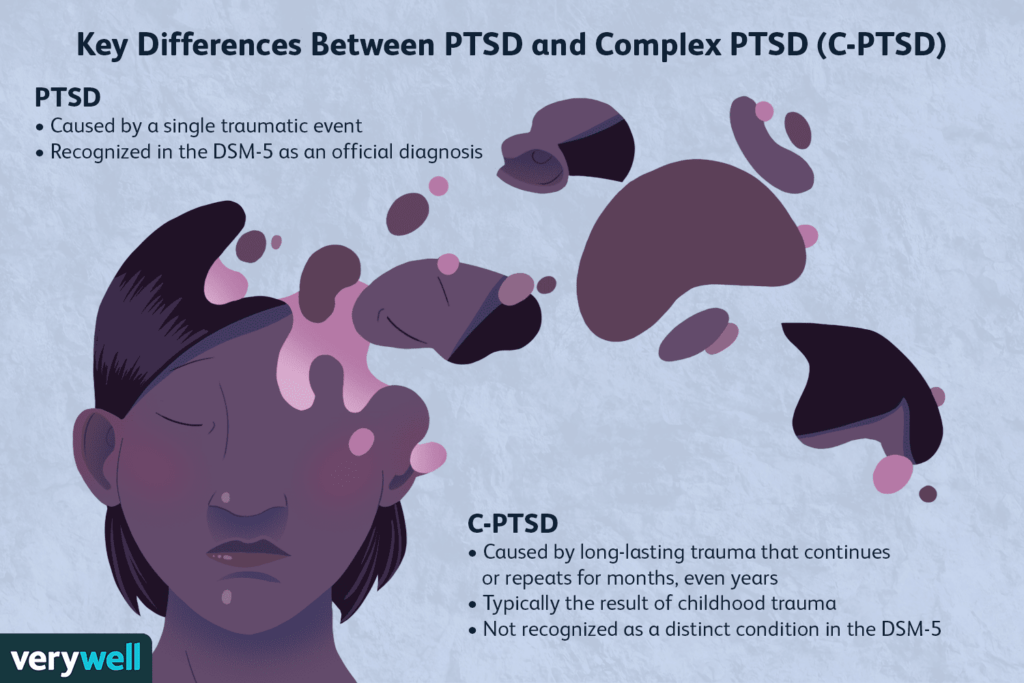PTSD And Complex PTSD – The Difference Between Them
Authors:
• Vianey Gonzalez – Licensed Psychologist Specialty in Crime Victim Trauma Therapy, Neuropsychologist, Certified Deception Professional, Psychology Advisory Panel & Director of the Society of Citizens Against Relationship Scams Inc.
• Tim McGuinness, Ph.D. – Anthropologist, Scientist, Director of the Society of Citizens Against Relationship Scams Inc.
Understanding the Scam Victim’s Challenges Navigating the Differences Between PTSD and Complex PTSD
Scam victims face intricate nuances in their trauma, by shedding light on the contrasting impacts of Post-Traumatic Stress Disorder (PTSD) and Complex Post-Traumatic Stress Disorder (C-PTSD) we hope to educate victims on their differences. By exploring these differences, victims can gain a deeper understanding of the emotional struggles they may face and how these distinct forms of trauma manifest.
Remember, this is not a replacement for professional counseling or therapy, we only hope to offer valuable insights for those navigating the path to recovery.
What is Complex PTSD?
Complex PTSD Post-Traumatic Stress Disorder (C-PTSD) is a psychological condition that can develop in individuals who have experienced prolonged and repetitive traumatic events, including the victims of relationship scams (such as romance scams or pig butchering cryptocurrency investment scams,) often over an extended period. It’s sometimes referred to as “complex” because it typically involves a combination of various traumatic experiences, such as physical or emotional abuse, neglect, exploitation, or interpersonal violence. Unlike classic PTSD, which usually results from a single traumatic incident, C-PTSD is associated with ongoing and recurring traumas, such as combining the new trauma with past untreated traumas.
C-PTSD is characterized by a range of symptoms and behaviors, which may include:
- Emotional Dysregulation: People with C-PTSD often struggle to manage their emotions, experiencing intense mood swings, anger, sadness, and anxiety.
- Disturbances in Self-Identity: Trauma survivors may have a fragmented or unstable sense of self. They might experience feelings of emptiness, worthlessness, or guilt.
- Problems in Relationships: Difficulty forming and maintaining healthy relationships is common. Survivors may struggle with trust, intimacy, and forming connections.
- Negative Self-Concept: Individuals with C-PTSD may develop a highly negative self-image, experiencing chronic self-doubt, self-criticism, and feelings of shame.
- Dissociation: C-PTSD can lead to episodes of dissociation, where individuals may feel disconnected from themselves or their surroundings. This can manifest as depersonalization or derealization.
- Emotional Flashbacks: Survivors of complex trauma may have emotional flashbacks, which involve re-experiencing intense emotions from past traumas.
- Hypervigilance and Avoidance: Like classic PTSD, C-PTSD can cause hypervigilance (being constantly on alert for potential threats) and avoidance of situations that trigger traumatic memories.
- Physical Symptoms: Chronic pain, sleep disturbances, and other physical symptoms may also be part of C-PTSD.
C-PTSD often stems from adverse childhood experiences, such as physical or sexual abuse, neglect, and domestic violence. It can also result from being exposed to chronic, traumatic stressors in adulthood, such as long-term abusive relationships, human trafficking, or captivity.
How is Complex PTSD Similar or Different from regular PTSD?
Complex Post-Traumatic Stress Disorder (C-PTSD) and Post-Traumatic Stress Disorder (PTSD) share similarities but also have important differences. Here’s how they differ:
- Type of Trauma:
- PTSD: Typically results from exposure to a single, shocking, or life-threatening event, such as a car accident, natural disaster, combat, or sexual assault.
- C-PTSD: Arises from prolonged and repetitive traumatic experiences, often occurring over months or years. It is more common in cases of chronic interpersonal trauma, such as childhood abuse, domestic violence, or human trafficking.
- Duration of Trauma:
- PTSD: Occurs after a single traumatic event.
- C-PTSD: Arises from chronic and prolonged exposure to traumatic situations.
- Symptoms:
- PTSD: Symptoms commonly include flashbacks, nightmares, and severe anxiety related to the traumatic event. Hypervigilance and avoidance are also key features.
- C-PTSD: In addition to symptoms similar to PTSD, C-PTSD often involves disturbances in self-identity, emotional dysregulation, and difficulties in forming and maintaining relationships. It’s characterized by a broader range of symptoms related to long-term interpersonal trauma.
- Emotional Dysregulation:
- PTSD: While individuals with PTSD may experience mood disturbances, they are not typically as pervasive or intense as in C-PTSD.
- C-PTSD: Emotional dysregulation, including intense mood swings, anger, and difficulty managing emotions, is a hallmark feature.
- Self-Identity:
- PTSD: Doesn’t necessarily affect one’s sense of self-identity.
- C-PTSD: Complex trauma often leads to disturbances in self-identity, with individuals experiencing feelings of emptiness, worthlessness, and chronic self-doubt.
- Relationship Issues:
- PTSD: While interpersonal issues may result from PTSD, they are not typically the central focus.
- C-PTSD: Problems in forming and maintaining healthy relationships are common and central to the diagnosis.
- Flashbacks:
- PTSD: Flashbacks in PTSD are usually vivid recollections of the traumatic event itself.
- C-PTSD: In C-PTSD, flashbacks are often emotional in nature, where individuals re-experience intense emotions from past traumas.
- Duration of Symptoms:
- PTSD: Symptoms of PTSD can be acute, lasting for several months after the traumatic event, or chronic, lasting for years.
- C-PTSD: Symptoms are often chronic and enduring, as they result from prolonged exposure to trauma.
- Treatment Approach:
- PTSD: Treatment for PTSD typically involves cognitive-behavioral therapies like exposure therapy, eye movement desensitization and reprocessing (EMDR), or medications like antidepressants or anti-anxiety drugs.
- C-PTSD: Due to the broader and more pervasive symptoms, treatment for C-PTSD often involves trauma-focused therapies (e.g., dialectical behavior therapy, schema therapy) that address complex issues around self-identity, relationships, and emotional regulation.
Important Note
It’s important to note that C-PTSD is not recognized as an official diagnosis in all mental health diagnostic systems (e.g., DSM-5). Instead, some professionals use the term to describe a cluster of symptoms commonly seen in individuals who have experienced chronic interpersonal trauma. The key distinction between C-PTSD and PTSD is the nature of the traumatic experiences and the resulting complex, pervasive, and enduring symptoms in the former.
Complex PTSD impacts Victims of Crime differently than normal PTSD
Complex PTSD – Post-Traumatic Stress Disorder (C-PTSD) and Post-Traumatic Stress Disorder (PTSD) share many symptoms, but they differ in their causes and long-term effects. Here’s how C-PTSD impacts victims of crime differently than normal PTSD:
- Duration and Complexity of Trauma:
- PTSD: Typically occurs as a result of a single traumatic event, such as a car accident, combat, or sexual assault.
- C-PTSD: Arises from prolonged, recurring trauma, often involving interpersonal victimization, such as childhood abuse, domestic violence, or long-term captivity.
- Symptom Profile:
- PTSD: Common symptoms include flashbacks, nightmares, hypervigilance, and emotional numbing.
- C-PTSD: Has a broader range of symptoms, which may include emotional dysregulation, interpersonal difficulties, self-esteem issues, and chronic feelings of emptiness.
- Self-Concept and Relationships:
- PTSD: May affect how a person perceives the world but not necessarily how they view themselves.
- C-PTSD: Often leads to a distorted self-concept, difficulty establishing and maintaining healthy relationships, and a sense of betrayal by others.
- Emotional Regulation:
- PTSD: May lead to emotional numbness or heightened states of anxiety and arousal.
- C-PTSD: Often results in difficulty regulating emotions, leading to intense mood swings, anger, and emotional reactivity.
- Triggers and Flashbacks:
- PTSD: Triggers and flashbacks are often related to a specific traumatic event.
- C-PTSD: Triggers can encompass a wide range of situations and relationships, as they relate to the complex trauma history.
- Recovery Challenges:
- PTSD: Recovery may involve processing the traumatic event and its impact on one’s life.
- C-PTSD: Recovery is more complex due to the cumulative nature of the trauma and the need to address issues related to identity, self-worth, and interpersonal functioning.
- Impaired Sense of Safety:
- PTSD: Primarily involves a compromised sense of safety related to the traumatic event.
- C-PTSD: Affects the individual’s overall sense of safety and trust in the world and in relationships.
- Interpersonal Impact:
- PTSD: May affect relationships but doesn’t always lead to a pattern of dysfunctional relationships.
- C-PTSD: Often results in difficulties in forming and maintaining healthy relationships and can perpetuate cycles of abuse or victimization.
How Might Complex PTSD (C-PTSD) Affect Scam Victims
Complex PTSD Post-Traumatic Stress Disorder (C-PTSD) can significantly impact individuals who have been victims of romance scams or fraud. Here’s how C-PTSD may affect these victims:
- Emotional Dysregulation: Victims of romance scams or fraud often experience intense emotions, including betrayal, shame, grief, anger, and self-blame. C-PTSD can exacerbate emotional dysregulation, making it challenging for victims to manage these intense feelings. They may struggle with mood swings, persistent sadness, and difficulty in calming their emotional responses.
- Distorted Self-Concept: C-PTSD can lead to a distorted self-concept, where victims may view themselves as gullible, foolish, or unworthy of love and trust. This distortion is compounded by the shame and self-blame often associated with falling for a scam. Victims may suffer from a diminished sense of self-worth and self-esteem.
- Difficulty in Trusting: Victims of romance scams or fraud often face difficulty in trusting others. C-PTSD can intensify these trust issues, making it challenging for individuals to rebuild trust in relationships, including new friendships or potential romantic partnerships.
- Repetitive Patterns: C-PTSD can perpetuate patterns of victimization. Victims may be vulnerable to falling into similar scams or abusive relationships due to their impaired ability to set boundaries and recognize warning signs. These repetitive patterns can hinder recovery and exacerbate the trauma.
- Relationship Struggles: Victims may encounter difficulties in forming and maintaining healthy relationships. The scars of the scam experience, coupled with the effects of C-PTSD, can lead to issues such as fear of vulnerability, a sense of unworthiness, or heightened reactivity in relationships.
- Isolation: Both the experience of the scam and C-PTSD symptoms can contribute to feelings of isolation. Victims may withdraw from social interactions, fearing judgment or further victimization. Isolation can hinder their recovery process.
- Flashbacks and Triggers: C-PTSD may result in flashbacks or emotional triggers related to the scam experience. Certain situations, words, or interactions can bring back intense emotions and memories associated with the scam, further exacerbating distress.
- Coping Mechanisms: Some individuals with C-PTSD may develop maladaptive coping mechanisms, such as substance abuse, self-harm, or unhealthy relationships, as a way to numb emotional pain or regain a sense of control.
- Recovery Challenges: C-PTSD complicates the recovery process for scam victims. Healing involves not only addressing the financial and emotional aftermath of the scam but also dealing with the deeper wounds and distortions that C-PTSD brings to the surface.
- Need for Professional Help: Victims of romance scams or fraud with C-PTSD may benefit from professional mental health support. Trauma-focused therapy, such as Cognitive-Behavioral Therapy (CBT) or Eye Movement Desensitization and Reprocessing (EMDR), can help victims process the trauma, develop healthier coping strategies, and rebuild their lives.
What might be more likely for Scam Victims to experience?
Individuals who have fallen victim to romance or relationship scams are at risk of experiencing a range of psychological and emotional challenges. The specific condition that may develop can vary among individuals, and it depends on factors such as their personal resilience, coping strategies, the duration and severity of the scam, and the presence of pre-existing vulnerabilities.
Here’s an overview of Three of the Potential Outcomes:
- Post-Traumatic Stress Disorder (PTSD):
- Symptoms: PTSD can manifest with symptoms like flashbacks, nightmares, severe anxiety, and emotional distress. Scam victims who experienced intense fear, threat, or witnessed violence during the scam might be more prone to PTSD.
- Triggers: Traumatic memories or reminders of the scam can trigger PTSD symptoms.
- Treatment: PTSD is typically treated with therapies like cognitive-behavioral therapy (CBT), exposure therapy, and medication.
- Complex Post-Traumatic Stress Disorder (C-PTSD):
- Symptoms: C-PTSD is an extended form of PTSD often associated with prolonged, interpersonal trauma. It includes typical PTSD symptoms and additional ones like emotional dysregulation, dissociation, and identity issues.
- Triggers: Scam victims who endured prolonged manipulation, coercion, or exploitation may be more likely to develop C-PTSD.
- Treatment: Treatment for C-PTSD involves therapies like dialectical behavior therapy (DBT) and eye movement desensitization and reprocessing (EMDR) therapy, along with medication for specific symptoms.
- Complex Grief:
- Symptoms: Complex grief, also known as prolonged grief disorder, involves intense and prolonged sorrow, longing, and difficulties in accepting the loss. It can lead to emotional numbness, bitterness, or a sense of emptiness.
- Triggers: Scam victims may experience complex grief if they develop a deep emotional connection with the scammer and feel a genuine loss when the scam ends. The grief can be complex due to the betrayal involved.
- Treatment: Complex grief is often treated with grief-focused therapy, which helps individuals process their emotions, memories, and the circumstances surrounding their loss.
Learn more about Complex Grief here.
It’s important to note that many scam victims may exhibit a mix of these emotional responses, as the experience of a romance or relationship scam can be multifaceted and emotionally complex. Additionally, individual responses to trauma can vary significantly.
Diagnosis & Treatment
Diagnosing and treating C-PTSD can be complex because of the varied and persistent nature of the symptoms. Psychotherapy, particularly trauma-focused therapy, is a common approach to treatment. Therapy may focus on helping individuals process traumatic memories, develop coping strategies, and build healthier relationships. Medication can also be used to manage specific symptoms like depression or anxiety.
It’s important to note that complex PTSD is not an officially recognized diagnosis in all mental health systems, such as the DSM-5 (Diagnostic and Statistical Manual of Mental Disorders). Instead, clinicians often use the term to describe a cluster of symptoms that are related to prolonged trauma.
Summary
Seeking professional help from therapists or counselors experienced in trauma and grief can be beneficial for scam victims. The choice of treatment should be tailored to the specific symptoms and needs of the individual. Over time, with the right support and intervention, many victims can work towards recovery and healing.
C-PTSD, as the name suggests, is more complex and pervasive than PTSD. It stems from prolonged exposure to traumatic experiences, especially within relationships. While both conditions can have a severe impact on one’s mental and emotional well-being, C-PTSD tends to affect a person’s core identity, relationships, and emotional regulation to a greater extent than PTSD. Both conditions, however, benefit from therapy and support to help individuals cope and heal.
C-PTSD can significantly affect individuals who have experienced romance scams or fraud.
It compounds the emotional distress and challenges that result from these scams, making recovery more complex. Recognizing the signs of C-PTSD and seeking professional assistance is crucial for victims to heal and regain a sense of control over their lives.
More:
- PTSD and Complex Grief/Complicated Grief – What Are The Differences? 2023 (scamsnow.com)
- C-PTSD (Complex PTSD): Symptoms, Causes, and Treatment (verywellmind.com)
- Complex PTSD: Symptoms and Risk Factors (verywellhealth.com)
- Mental Compartmentalization And Recovery For Scam Victims 2023 (scamsnow.com)
- Motivational Denial (scamsnow.com)
- Secrets Can Be Deadly For Scam Victims – Scam Victim Recovery Psychology (scamsnow.com)
- Relationship Scams And Their Impact On Memory (scamsnow.com)
- Scam Victims And The Reactivity Loop (scamsnow.com)
- Scam Victim Suicides Are Up – New Data Hints (scamsnow.com)
- Scam Victims & Mental Health Blaming (scamsnow.com)
- Scam Victim Resiliency – Why It Is So Much Worse After The Scam (scamsnow.com)
- Dealing With Grief & Recovery During The Holidays (romancescamsnow.com)
- The Complicated Truth About Scam Victim Grief (romancescamsnow.com)
- Psychology Of Scams: A Candid Discussion Of Grief By Nora McInerny – TED Talk [Video] (romancescamsnow.com)
SCARS Resources:
- For New Victims of Relationship Scams newvictim.AgainstScams.org
- Subscribe to SCARS Newsletter newsletter.againstscams.org
- Sign up for SCARS professional support & recovery groups, visit support.AgainstScams.org
- Find competent trauma counselors or therapists, visit counseling.AgainstScams.org
- Become a SCARS Member and get free counseling benefits, visit membership.AgainstScams.org
- Report each and every crime, learn how to at reporting.AgainstScams.org
- Learn more about Scams & Scammers at RomanceScamsNOW.com and ScamsNOW.com
- Global Cyber Alliance ACT Cybersecurity Tool Website: Actionable Cybersecurity Tools (ACT) (globalcyberalliance.org)
- Self-Help Books for Scam Victims are at shop.AgainstScams.org
- Donate to SCARS and help us help others at donate.AgainstScams.org
- Worldwide Crisis Hotlines: International Suicide Hotlines – OpenCounseling : OpenCounseling
- Campaign To End Scam Victim Blaming – 2024 (scamsnow.com)
-/ 30 /-
What do you think about this?
Please share your thoughts in a comment below!
More ScamsNOW.com Articles
-/ 30 /-
What do you think about this?
Please share your thoughts in a comment above!
SCARS LINKS: AgainstScams.org RomanceScamsNOW.com ContraEstafas.org ScammerPhotos.com Anyscam.com ScamsNOW.com
reporting.AgainstScams.org support.AgainstScams.org membership.AgainstScams.org donate.AgainstScams.org shop.AgainstScams.org
youtube.AgainstScams.org linkedin.AgainstScams.org facebook.AgainstScams.org
ARTICLE RATING
TABLE OF CONTENTS
- Understanding the Scam Victim’s Challenges Navigating the Differences Between PTSD and Complex PTSD
- What is Complex PTSD?
- How is Complex PTSD Similar or Different from regular PTSD?
- Important Note
- Complex PTSD impacts Victims of Crime differently than normal PTSD
- How Might Complex PTSD (C-PTSD) Affect Scam Victims
- What might be more likely for Scam Victims to experience?
- Diagnosis & Treatment
- Summary
- More:
- SCARS Resources:
- SCARS Institute™ ScamsNOW Magazine
Society of Citizens Against Relationship Scams Inc. [SCARS]
CATEGORIES
MOST POPULAR COMMENTED ARTICLES
POPULAR ARTICLES
U.S. & Canada Suicide Lifeline 988
![NavyLogo@4x-81[1]](https://scamsnow.com/wp-content/uploads/2025/04/NavyLogo@4x-811.png)
ARTICLE META
WHAT PEOPLE ARE TALKING ABOUT LATEST SITE COMMENTS
See Comments for this Article at the Bottom of the Page
on Transference And Emotional Danger After The Scam – 2024: “Thank you for the kind but firm reminder that the person in the stolen profile photo has their own life.…” Jul 9, 01:26
on ‘Mental Defeat’ – The Unique Condition Of Giving Up – 2024: “Thank you for another great article. I can see from this article that mental defeat would be debilitating to a…” Jul 9, 00:49
on Trust: Romance Scams Betrayal And Scam Victims – 2024: “This provided valuable insight that I can identify with” Jul 8, 16:44
on A Scam Victim in Extreme Distress – Stopping the Pain – 2024: “Your trust issues are very understandable. We are very sorry this happened to you. We suggest that you contact an…” Jul 8, 14:42
on A Scam Victim in Extreme Distress – Stopping the Pain – 2024: “My online counselors advised me to check myself in. I went to the hospital because I was suicidal. After I…” Jul 8, 13:44
on Scam Victim Catastrophizing Making Recovery Difficult 2024: “Excellent article on catastrophizing. I can understand how this could take a person down a rabbit warren of never ending…” Jul 8, 12:12
on The Self-Pity Trap & How To Overcome It – 2023 – [UPDATED 2025]: “I am not in the habit of feeling sorry for myself. After the deception, although it was not easy at…” Jul 8, 11:49
on Pride – A Dual Edged Sword For Scam Victims – 2023 [UPDATD 2024]: “Looking back over my life I have seen how pride has impacted me both positively and negatively. However the negative…” Jul 8, 09:08
on The Self-Pity Trap & How To Overcome It – 2023 – [UPDATED 2025]: “I felt self-pity while the enormity of my financial loss washed over me like a tsunami. The self-pity lasted only…” Jul 7, 18:55
on The Uniqueness Of Scam Victims Or Fraud Victims – 2024: “unfortunately all true. It is highly stressful dealing with the aftermath. I am being sued for the money I borrowed…” Jul 6, 12:50
on Scam Victims & Mental Health Blaming – 2023 [UPDATED 2025]: “For most of my life words have defeated me, made me feel insignificant, unwanted, unneeded. For this reason it is…” Jul 5, 13:36
on Substance Abuse Susceptibility And Scam Victims – 2024: “It is understandable how some would feel that alcohol or substance abuse would be helpful in handling their feelings after…” Jul 1, 20:36
on Scam Victims Use Work To Avoid Healing: “The last 6 years have been the most difficult of my life. The pandemic, having both parents in the hospital…” Jun 29, 18:38
on Entitlement Mentality And How Scam Victims Often Lose Their Path To Recovery – 2024: “Thank you for this discussion of entitlement. I can see from the descriptions listed that I have not felt entitlement.…” Jun 29, 18:22
on Samurai Wisdom and Rituals for Clearing the Mind After Scam Trauma – 2025 – [VIDEOS]: “A great guide on how to move forward in our recovery process with a calm mind, cleansed on an ongoing…” Jun 28, 07:34
on Delayed Gratification and Patience in Scam Victim Recovery – 2025 – [VIDEOS]: “We want to recover quickly and… we make new mistakes. How not to speed up the recovery process, how to…” Jun 28, 06:41
on The Unique Injury Of Betrayal Trauma On Scam Victims – 2024: “Primarily because you did not see it coming” Jun 27, 23:57
on Changes In A Scam Victim’s Life: “I really detest the way my trust in others has been affected by the scamming I went through. I used…” Jun 27, 14:47
on The Unique Injury Of Betrayal Trauma On Scam Victims – 2024: “Betrayal Trauma is the worst feeling ever. Why does it seem so much worse when a scammer does that to…” Jun 27, 14:34
Important Information for New Scam Victims
Please visit www.ScamVictimsSupport.org – a SCARS Website for New Scam Victims & Sextortion Victims
SCARS Institute now offers a free recovery program at www.SCARSeducation.org
Please visit www.ScamPsychology.org – to more fully understand the psychological concepts involved in scams and scam victim recovery
If you are looking for local trauma counselors, please visit counseling.AgainstScams.org
If you need to speak with someone now, you can dial 988 or find phone numbers for crisis hotlines all around the world here: www.opencounseling.com/suicide-hotlines
Statement About Victim Blaming
Some of our articles discuss various aspects of victims. This is both about better understanding victims (the science of victimology) and their behaviors and psychology. This helps us to educate victims/survivors about why these crimes happened and not to blame themselves, better develop recovery programs, and help victims avoid scams in the future. At times, this may sound like blaming the victim, but it does not blame scam victims; we are simply explaining the hows and whys of the experience victims have.
These articles, about the Psychology of Scams or Victim Psychology – meaning that all humans have psychological or cognitive characteristics in common that can either be exploited or work against us – help us all to understand the unique challenges victims face before, during, and after scams, fraud, or cybercrimes. These sometimes talk about some of the vulnerabilities the scammers exploit. Victims rarely have control of them or are even aware of them, until something like a scam happens, and then they can learn how their mind works and how to overcome these mechanisms.
Articles like these help victims and others understand these processes and how to help prevent them from being exploited again or to help them recover more easily by understanding their post-scam behaviors. Learn more about the Psychology of Scams at www.ScamPsychology.org
SCARS INSTITUTE RESOURCES:
If You Have Been Victimized By A Scam Or Cybercrime
♦ If you are a victim of scams, go to www.ScamVictimsSupport.org for real knowledge and help
♦ Enroll in SCARS Scam Survivor’s School now at www.SCARSeducation.org
♦ To report criminals, visit https://reporting.AgainstScams.org – we will NEVER give your data to money recovery companies like some do!
♦ Follow us and find our podcasts, webinars, and helpful videos on YouTube: https://www.youtube.com/@RomancescamsNowcom
♦ Learn about the Psychology of Scams at www.ScamPsychology.org
♦ Dig deeper into the reality of scams, fraud, and cybercrime at www.ScamsNOW.com and www.RomanceScamsNOW.com
♦ Scam Survivor’s Stories: www.ScamSurvivorStories.org
♦ For Scam Victim Advocates visit www.ScamVictimsAdvocates.org
♦ See more scammer photos on www.ScammerPhotos.com
You can also find the SCARS Institute on Facebook, Instagram, X, LinkedIn, and TruthSocial
Psychology Disclaimer:
All articles about psychology and the human brain on this website are for information & education only
The information provided in this and other SCARS articles are intended for educational and self-help purposes only and should not be construed as a substitute for professional therapy or counseling.
Note about Mindfulness: Mindfulness practices have the potential to create psychological distress for some individuals. Please consult a mental health professional or experienced meditation instructor for guidance should you encounter difficulties.
While any self-help techniques outlined herein may be beneficial for scam victims seeking to recover from their experience and move towards recovery, it is important to consult with a qualified mental health professional before initiating any course of action. Each individual’s experience and needs are unique, and what works for one person may not be suitable for another.
Additionally, any approach may not be appropriate for individuals with certain pre-existing mental health conditions or trauma histories. It is advisable to seek guidance from a licensed therapist or counselor who can provide personalized support, guidance, and treatment tailored to your specific needs.
If you are experiencing significant distress or emotional difficulties related to a scam or other traumatic event, please consult your doctor or mental health provider for appropriate care and support.
Also read our SCARS Institute Statement about Professional Care for Scam Victims – click here
If you are in crisis, feeling desperate, or in despair, please call 988 or your local crisis hotline.
More ScamsNOW.com Articles
A Question of Trust
At the SCARS Institute, we invite you to do your own research on the topics we speak about and publish. Our team investigates the subject being discussed, especially when it comes to understanding the scam victims-survivors’ experience. You can do Google searches, but in many cases, you will have to wade through scientific papers and studies. However, remember that biases and perspectives matter and influence the outcome. Regardless, we encourage you to explore these topics as thoroughly as you can for your own awareness.


















![scars-institute[1]](https://scamsnow.com/wp-content/uploads/2025/04/scars-institute1.png)
![niprc1.png1_-150×1501-1[1]](https://scamsnow.com/wp-content/uploads/2025/04/niprc1.png1_-150x1501-11.webp)

I feel that I’ve experienced a mix of the emotional responses listed here. 2024 was filled with many traumatic events: I lost my Mom in January, fell and broke my arm 4 days after she died, had divorce papers drawn up in February, the scammers began siphoning money from me in February and continued to until the end of August, I was told I was going to lose my job of nearly 30 years in October. The scammers stole all of my retirement, most of my savings and I took out loans. Therapy helped to keep me “on the right side of the grass” last year. Thoughts of ending it all continued for 3 months after I realized I was the victim of a grand betrayal and crime. Finding SCARS and enrolling in the Survivor’s School along with joining their FB support group has taught me so much, which has ultimately helped me find a path toward healing. This article gives great insight on why the first few months were so dark.
This article really hit home. I experienced trauma growing up, experienced trauma in my first marriage, have had much trouble in maintaining relationships and experience a feeling of loss of control. And now, I experienced my fraud that was super intense over a period of about two months. Then there were two months where the relationship cooled down and the criminal tried to fit me into another method of working with them. Then I stopped communication. The two months of active bonding, grooming and manipulating were very intense. And in that mix was much anger from the criminal because I wasn’t doing what they wanted when they wanted it. My emotions were up when they were expressing love and admiration and down in seconds when they would get angry. I think that C-PTSD is what I may be experiencing.
I feel somewhat that I am trying to deal with a form of C-PTSD. In the last 9 months I have been a victim of a PBS, then a regular romance (relationship) scam, my dog of 14 years died, and I am currently dealing with a major flood where walls, ceilings and floors are being replaced.